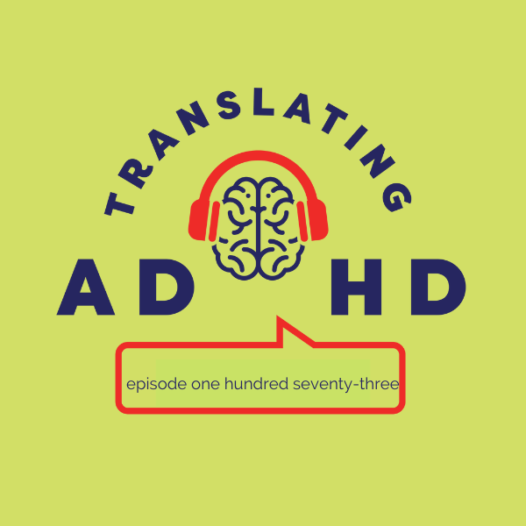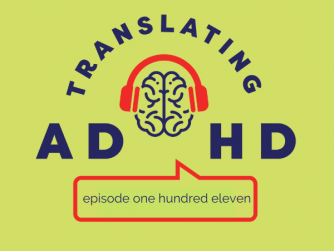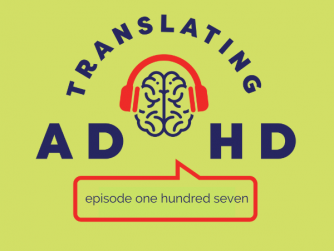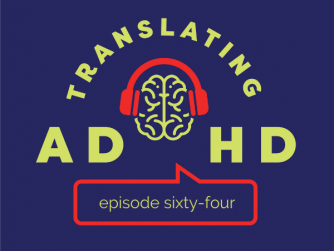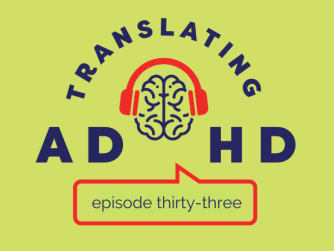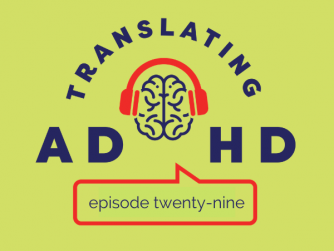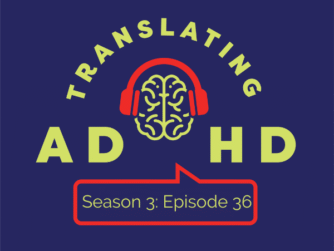Ash and Cam shift their focus to the workplace with regard to the current story arc on being misunderstood with ADHD. Leading with Yours-Mine-Ours, Asher and Cam talk about ADHD challenges in the context of larger potential workplace challenges that can plant the seeds for misunderstanding. There are some environments and some managers where no amount of ADHD management will make the situation tenable. Those of us with ADHD, when in a One-Down state, can feel like we are the instigators of all of the misunderstanding in a workplace.
The hosts go on to share scenarios where the seeds of misunderstanding can be planted when ADHD is in the mix: When we lean on one role to the detriment of another, when we don’t deliver on a promise, when we don’t communicate or inquire about expectations. Ash and Cam share a number of examples from clients to working with teams. A refreshing approach to what is often a difficult topic to address.
Episode links + resources:
For more of the Translating ADHD podcast:
- Episode Transcripts: visit TranslatingADHD.com and click on the episode
- Follow us on Twitter: @TranslatingADHD
- Visit the Website: TranslatingADHD.com
Episode Transcript:
Ash: Hi, I’m Ash.
Cam: And I’m Cam.
Ash: And this is Translating ADHD. As a reminder, registration is open for our next group coaching class, which is Resilience. It begins Tuesday, June 13th and meets at 8:30 PM Eastern on Tuesdays. For pricing information about the course and the application itself, visit the website TranslatingADHD.com and click on the group coaching tab.
Cam: I wanna add something there, Ash. So you’re very interested in coaching. Our group coaching is a great place to try it out, and we are expecting a full class. So we want to get your application in if you have any interest in this course or doing a course with Asher and myself. Just wanna throw that in.
Ash: Yeah, thanks for that. So Cam, where are we going today?
Cam: So Ash, where we’re going today is along the same lines of the last couple weeks, being misunderstood with ADHD. So we looked at childhood origins. We’re looking at the manifestation of how it plays out as adults. We started to look at being misunderstood in relationships. And now we’re gonna look at being misunderstood at work.
And I think that this is one of the main reasons why the podcast resonates with them is this challenge around work. And so it’s a big topic. It might be covered in one episode, but I’m wondering if it might be two or even three episodes here. And I think that work is shifting and changing and evolving, and for some reason we embrace these best practices from 1928, right? Everyday I see these motivational quotes on LinkedIn, you know, that are just out of the mouth of Dale Carnegie. You know, seize the day, Asher. Here’s one I just pulled up: “Remember today is the tomorrow you worried about yesterday.” No.
Ash: What does that mean?
Cam: I know. So first of all, there’s a lot of mediocre management out there already. And it might be that you suffer from bad management or a bad manager. And in this whole context of what’s yours, what’s mine, what’s ours, the ADHD is gonna come into play a bit. But to appreciate it in the larger context of is this environment? An environment that’s conducive for you and your wiring? You know.
So one of the big things, again, especially when there’s results or performance driven individuals in a group, they default to this. We must be accountable for our time. Right there. Accountability and time are two areas that we can struggle with with ADHD. I can’t be accountable to myself, and I struggle with the perception of time. Just that Dale Carnegie quote right there. It makes no sense to either of us because of our own interpretation of what time actually is.
So this is something that’s fraught with lots of different complexities. We’re gonna come in here and have a look at what’s going on, and what our listeners can start to do about this when they’re feeling misunderstood at work.
Ash: So Cam, let’s start by saying that most of the time when our clients are feeling quote unquote misunderstood at work, that’s not what they’re bringing to a coaching session. They are bringing this perspective of, it is my fault, my problem, and I need to fix it.
And don’t get me wrong, ADHD does present challenges in the workplace, and we’re going to get there. But where I like to start when I don’t know a lot about a client’s workplace, and that’s what they’re bringing is with that yours, mine, and ours. What is my client’s stuff to solve and what isn’t?
I have had so many clients who come to coaching with the perspective of this is my fault and my problem to solve, and we discover that that’s not true. Whether it is the quote unquote bad boss or just a bad system or bad environment. And as far as systems and environments go, I can give you some categorical examples there. Special education, medicine, social work. These are fields that require an immense amount of paperwork, and depending upon the system you’re in, you’re often working with government funding. So all of the emphasis is put on the paperwork, not the performance with the person you’re serving.
Cam: And I’ll add this accountability for time spent. That you are spending your time doing your job, and then you’re having to account for how you spent your time. So we have to be able to track and then articulate why we did what we did. This whole compliance element that yes, there’s certain jobs that really can be a bit of a test for the neurodivergent brain.
Ash: Yeah, I had a client who was a social worker and absolutely loved client work – loved it, and was really good at it. Was not so good at getting his paperwork in on time. And when we broke down what it would take for him to be able to stay compliant with his paperwork requirements and how little time that would actually leave to do his good work, I asked him the question of, okay, if we can get there, how do you feel about this job now? He realized this is not a fit for me. This environment measures performance on paperwork, not on client results. This is not the field I’m supposed to be in, and he is no longer in that field.
Cam: So I appreciate where we’re starting in the sense of, again, environment and is the job right or wrong for you to look at, you know, first and foremost. I love that approach of to get context there and get a sense of, is this something that we can create real change within? Because if we’re in this uphill battle about trying to be understood in a situation we really can’t change, or we’re always in our challenge areas, again, as you said, our clients come to us and they’re sort of focused on the dilemma and the challenge and often hyper-focused there and not really considering their strengths that they bring to the table or the value, the value that they bring in a certain situation.
But let’s just say that the client is in a space where they have a skillset and misunderstanding starts to bubble up, I think it’s worthwhile to share a few examples of how does misunderstanding creep into the workplace? And I would say one in particular is this whole, again, accounting for time and this rule around if they’re not here, they’re not contributing.
This got all turned on its head with Covid and work from home. But this whole idea again of some rule from the 1920s, from the dawn of the industrial revolution of if you’re not sitting in your cubicle, if you’re not looking at your screen, you’re somehow not a contributing member of the team, the organization.
So again, this sort of mediocre manager approach of, you know, accountability is that you are there. Well, guess what people, we do some of our best thinking away from the screen, and so there’s a misunderstanding of, oh, they’re not at their station, therefore they’re not contributing, they’re not adding value. And so then you get the micromanager response there.
Another one is around the delivering on our word. I think that this is one of the biggest challenges, is that we can do the day-to-day, and yet those things that we commit to that don’t have any real external urgency, and that we say that we’re committed to doing and that we never get to because it never rises to this level of urgency where we get to activate the ARC system. Right. So then we’re apologetic for not doing this thing we committed to, and that’s where we talked about last week, Ash, with respect to there’s misunderstanding in the room, and we are misunderstanding ourselves here too. We are not understanding how our ADHD is impacting around these things that are part of most jobs, right?
There’s the stuff you’ve gotta do today, but there’s that long-term project, proposal, initiative you are in charge of, you’re managing and you’re not getting to it. And it’s hard to explain to others why you’re not getting to it. And why you’re not necessarily delivering on these deliverables that are set at specific dates. But that right in there might be a whole other episode because this is one of the reasons why people come to me is they say, I cannot hold myself accountable. I’m a great responder reactor, but me trying to take the initiative on something that only matters to me, can’t get any traction there.
So those are a couple, right? It’s that and accountable for our time. And the other thing is just like being able to operate within the unwritten rules of an organization. This is something that I always struggled with when I was in an organization when I was teaching, is these people seem to have some manual on how to show up, and all these things that are not written down in my job description. Right. And so again, that can be another area.
Ash: Cam, I have a client going through this right now. He just started a new job, and he is in a small organization. And he is the only person in his organization that does what he does. In previous roles, he has been accused of being things like antisocial or not a team player, which couldn’t be further from the truth if you knew my client. He is an introvert, but very personable and very interested in involving others in what he’s doing.
So a lot of what we’ve been doing is we’ve been unpacking that story to figure out what elements of that are true and what elements aren’t. And then for the elements that are true that represent his ADHD challenges, okay, how can we treat this like the useful information that it is and have a different experience here in this job. In a place where he’s particularly at risk of going into introvert mode because he is the only person doing his role.
And so it’s a twofold thing, right? It’s unpacking the story and letting go of all the stuff that’s not helpful, including that statement as a statement of fact that my client is antisocial or not a team player. Those things are not true, even if he was misunderstood by someone else to be that way.
And two, looking for how did that misunderstanding happen or how might it have happened in hindsight. And what are the opportunities here in this role to have a different experience to be seen as somebody who is a part of the team?
Cam: That’s a great example. It reminds me of a client long time ago who was an engineer. He loved tinkering and getting down into the details of an engineering project. And here he is promoted to a management position where all of a sudden he is now managing 150 engineers.
Well, this is actually an ADHD thing that I see a lot of in the sense of we have multiple roles that we play. There’s the work we do, but then there are these other roles, and this is about managing expectations. This is a fascinating conversation today is that it’s sort of like, what are the seeds of misunderstanding? How does misunderstanding crop up? Often it’s this an assumption is planted and then people look for specific evidence to support that assumption. That’s that ladder of inference we’ve talked about.
And so my client, he would just love to go and work on something. Kind of like get down in the details. We use this analogy of, you know, he was like the engineer on a train, but he wasn’t the conductor in the sense the conductor had to go through the cars and communicate to people. Right. Next station. Right. Where are we with this? This is where I am.
And this is the fascinating thing, is when people don’t have information, they start to fill in the blank. So all of us have this other job that we tend to downplay around managing expectations and communicating effectively what we’re doing, why we’re doing it. And this goes in this whole area around value, is that starting to really understand and appreciate our values so that we can start to communicate it to others.
I’m gonna piggyback this right onto another example of a client right now who is an engineer. His immediate manager doesn’t really understand him, doesn’t want to be a manager and realizes it’s a real liability for him. So what has he done? He’s looked at ways to innovate, to diversify, to communicate his value, and create connections around this mediocre manager right above and to the side and below. Again, to put out these tethers and to communicate expectations. Also to communicate needs.
I think that so often when we get into the workplace discussion, Asher, people want to go to accommodations, wanna go to, you know, what’s the accommodation here? Do I disclose my ADHD? I think that the stuff that we talk about around what’s mine, what’s ours, this is in the realm of modifications. So what are the modifications that would really be beneficial for me? I spend a lot of time looking at what’s the frustration that’s happening at work, and can we take that and look at what’s the underlying unmet need.
This is – we talked about last week with that one of our members in the Discord community – of the front emotion and the underlying emotion, and a part of that underlying emotion is an underlying, unmet need. So as we get in here and you feel like, again, strong emotions about being misunderstood, we want to go and try to like or explain, or avoid conflict, whether it’s real or not real, to, okay, what’s really going on and is there a need that’s not getting met by either me or the people around me? And if there’s a source where it’s really tough, can I start to diversify and communicate?
What’s really fascinating what happened with this most recent, the example of the recent client who’s an engineer, is when he started to get data from reliable resources around this mediocre manager, then he got this feedback loop of, oh, okay, I am adding value. This is how I’m adding value, and this is how I can add more value. And then guess what? Then it creates a way to prioritize and focus on the stuff he really needs to focus on.
Because here’s the other thing that’s misunderstood: We have so much more that we can do in any given day than we can possibly get done. So we’ve got to be able to prioritize. And that’s another thing that’s misunderstood in work situations is people don’t understand or think I’ve gotta do it myself. I find that team situations are a beautiful place to check in. To see, hey, what is our priority here people? To get that feedback so we’re not trying to do all that work and all that management ourselves.
Ash: It’s so interesting that the work that we do with individual clients who are working in work teams has this ripple effect of not just improving our client’s experience, but bettering the work team. Prior to deciding that ADHD was going to be my coaching specialty, I coached work teams for a while. It was really fun and interesting work. I would go sit down for two or three hours with the whole team, the goal of let’s agree on what the challenges are, and let’s get all the perspectives in the room about those challenges. And then let’s agree on some paths forward. So everybody’s perspective is on the table.
And I found this to be almost universally true, is if one person on a team is struggling with something, chances are so is everyone else. I feel like I’m interrupted all the time. Guess what? If you feel like you’re interrupted all the time, so does everyone else on your team. I feel like I can’t keep on top of my email. Guess what? Everyone feels like they can’t keep on top of their email. Right? And this isn’t just ADHD people, right?
It’s so interesting how we all can kind of get in our silos and tell this story that other people don’t struggle with what we’re struggling with. Other people don’t have these challenges or these frustrations. Other people aren’t bothered by the constant interruptions the way that I’m bothered, and it’s simply not true. Right?
So that data gathering is such a huge thing because it fills in that context that our ADHD brains want, and it creates an opening to dialogue with colleagues about these things, right? It’s not just you. And the most important thing it does is it disarms that story of other people, right? My neurotypical coworkers don’t have struggles. I’m the only one that struggles in this way.
Cam: Or conversely, I got no problem. They’re all the problem. Right? Whether it’s neurodiverse or neurotypical or whatever. There can be a flip there. It’s again that defiant, dismissive early in the ADHD diagnosis. It’s like, I don’t have a problem – y’all have a problem here.
And so I really appreciate where this is shifting to in the sense of work environments, work teams. And what it comes down to is we’re humans that crave connection and understanding. But it’s very easy for us to plant the seeds of misunderstanding with misinformation on this very quickly, right? The stakes are high. If I make a mistake here, I could lose my job. I could lose this contract, I could lose this. That pressure is there and we do this and going up the ladder of inference of assumption.
I love that example of when you get ’em in the room, and bring the what are we all feeling? What are the perspectives in the room? What are the tensions? Put ’em on the table and is this to kind of put it out there? So to get clear of, oh wow, so John over in accounting struggles the same way I struggle, right. This is empathy, this is a sense of appreciating the other has a dilemma similar to mine.
Ash: So, listeners, the kind of the moral of this story today is ADHD plays a role in workplace struggles and is the cause of some workplace struggles. But it’s not nearly the whole picture. And the thing is, is ADHD can become this kind of convenient excuse or scapegoat or villain. If I didn’t have ADHD, if I could just manage my ADHD, then all of my workplace problems would go away I can say in any situation.
I gave a pretty extreme example at the start of the episode client who completely changed careers, right? But in any situation, be it one like that, or be it one like the client you were just talking about, Cam, where you’re doing the work within the context of this workplace and it’s working, ADHD is only part of a bigger picture because you at work are one person that is part of a bigger picture.
Getting that context, getting clearer on what it really is. What’s brilliant at cause and what is within your ability to affect change and what is not. Your client can’t work with the mediocre manager, can’t necessarily affect change that way, but he’s able to work around it. And he’s not the only one struggling with that particular person.
Cam: So as we finish up here, I was just thinking about you mentioned the ripple effect, right? The ripple effect of misunderstanding and what that can create. There is a counter to that. There is an opposite effect. We can create a positive ripple effect in the other direction. And it really starts with pausing and considering what is the dilemma that I’m having? What’s the dilemma that the team is having? And start to share in a safe place and articulate what that is. And is there also a value that’s not getting honored?
I think that that’s the other thing that happens, Ash, is that we can work so hard to trying to mitigate all these challenges that our biggest value is the last thing on our list of the day. So pausing for a second, thinking about where do I bring big value at work? How is that showing up in my day? How is that showing up in my interactions? How am I conveying that to others? I think that’s another thing that we make an assumption, is that that’s pretty clear what my value is. And time and time again, people are surprised when that’s not the case. People don’t necessarily see that value or they take it for granted, and often we don’t see the value because it’s not hard. It’s back to that what we think is easy is just easy. Really consider that what’s easy is a strength or of some value.
So listeners, we’re just scratching the surface here, and we’re gonna do more in this area around misunderstanding and work. But in the meantime, just to take stock, to bring that keen observer. Start to develop some understanding of what’s in play at work. How is your ADHD showing up, but also what else is at play? And to start to look at can you share where can you get some accurate data, some feedback to counter that natural? I must be messing up. I must be blah, blah, blah. That inner critic. It can so easily take hold of a situation. Get some feedback to get a sense of a balanced view of your situation at work.
Ash: Well said, Cam. And I think that’s a great place for us to wrap it up for today. Listeners, if you like what we’re doing here on the show, it has been quite a while since one of you has left a review. So if you have the time in your day and you’re able to do so, we would appreciate you leaving a review wherever you listen to the show. This helps other people know how we stand apart from other podcasts and helps other people find the show. So until next week, I’m Ash.
Cam: And I’m Cam.
Ash: Oh, we should leave that in. I was waiting. I was waiting. I was like, come on Cam, come on.
Cam: Had a glitch. That was a glitch, listeners.
Ash: I thought you froze. Like you weren’t moving. You were just sitting there.
Cam: I glitched. I glitched. I’m communicating in a safe place so we don’t have a misunderstanding, Asher.
Ash: Love it.
Cam: Glitched.
Ash: So, listeners, this was the Translating ADHD podcast. Thanks for listening. We’ll see you next week.

